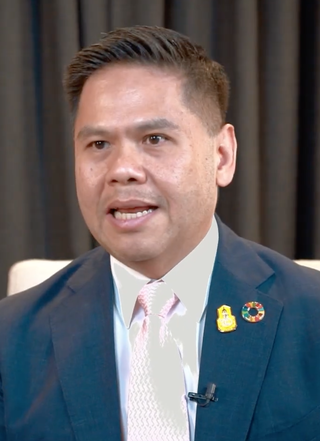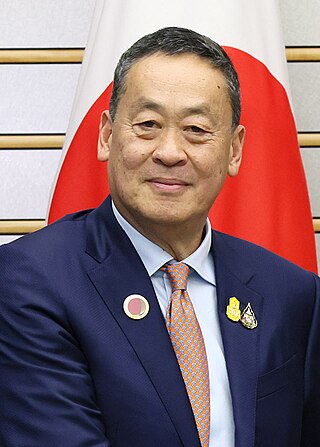
The Politics of Thailand are conducted within the framework of a constitutional monarchy, whereby the prime minister is the head of government and a hereditary monarch is head of state. The judiciary is independent of the executive and the legislative branches.

The Australian Senate is the upper house of the bicameral Parliament of Australia, the lower house being the House of Representatives.
The electoral system of Australia comprises the laws and processes used for the election of members of the Australian Parliament and is governed primarily by the Commonwealth Electoral Act 1918. The system presently has a number of distinctive features including compulsory enrolment; compulsory voting; majority-preferential instant-runoff voting in single-member seats to elect the lower house, the House of Representatives; and the use of the single transferable vote proportional representation system to elect the upper house, the Senate.

The Senate is the upper house of the Cortes Generales, which along with the Congress of Deputies – the lower chamber – comprises the Parliament of the Kingdom of Spain. The Senate meets in the Palace of the Senate in Madrid.
Some parts of the Government of Thailand are selected through democratic elections. These include the House of Representatives of Thailand,, local Administrations, Governorship of Bangkok and national referendums. Thailand has so far had 28 general elections since 1933; the last election was in 2023. Voting in elections in Thailand is compulsory. All elections in Thailand are regulated by the Election Commission of Thailand.
Elections in the Philippines are of several types. The president, vice-president, and the senators are elected for a six-year term, while the members of the House of Representatives, governors, vice-governors, members of the Sangguniang Panlalawigan, mayors, vice-mayors, members of the Sangguniang Panlungsod/members of the Sangguniang Bayan, barangay officials, and the members of the Sangguniang Kabataan are elected to serve for a three-year term.

The Legislature of Liberia is the bicameral legislature of the government of Liberia. It consists of a Senate – the upper house, and a House of Representatives – the lower house, modeled after the United States Congress. Sessions are held at the Capitol Building in Monrovia. Legislature of Liberia is considered one of the three branches of government based on the Article III of the Constitution of Liberia that stipulates all three branches ought to be equal and coordinated based on the Principle of checks and balances.

Prayut Chan-o-cha is a Thai retired politician and army officer who became the 29th Prime Minister of Thailand from 2014 when he seized power in a military coup, to 2023. He also served as the minister of defence, a position he held in his own government from 2019 to 2023. Prayut served as Commander-in-Chief of the Royal Thai Army from 2010 to 2014 and led the 2014 Thai coup d'état which installed the National Council for Peace and Order (NCPO), the military junta which governed Thailand between 22 May 2014 and 10 July 2019.
Senate elections were held in Thailand on 29 March 2014 for the second time under the 2007 constitution. Half the senate seats were elected for non-partisan candidates under the first-past-the-post voting system, with voters electing one senator per province. Voter turnout was 43%, down from 56% in the 2008 senate elections and 46% in the February 2014 general elections, which had been boycotted by the opposition,

General elections were held in Thailand on 24 March 2019. They were the first elections since the 2014 Thai coup d'état that installed coup leader General Prayut Chan-o-cha as prime minister, and the first held in accordance with the 2017 constitution, which was drafted under the ruling military junta. The elections selected the five hundred members of the new House of Representatives, the previous House having been dissolved by the coup.

The history of Thailand since 2001 has been dominated by the politics surrounding the rise and fall from power of former Prime Minister Thaksin Shinawatra, and subsequent conflicts, first between his supporters and opponents, then over the rising military influence in politics. Thaksin and his Thai Rak Thai Party came to power in 2001 and became very popular among the electorate, especially rural voters. Opponents, however, criticized his authoritarian style and accused him of corruption. Thaksin was deposed in a coup d'état in 2006, and Thailand became embroiled in continuing rounds of political crisis involving elections won by Thaksin's supporters, massive anti-government protests by multiple factions, removals of prime ministers and disbanding of political parties by the judiciary, and two military coups.

General elections were held in Thailand on 14 May 2023 to elect 500 members of the House of Representatives. The Move Forward Party, led by Pita Limjaroenrat, surprised analysts by winning the most seats, followed by fellow opposition party Pheu Thai who had won the most seats in the 2011 and 2019 elections. Turnout was a record 75.22%.

The Move Forward Party is a social democratic and progressive political party in Thailand. It opposes the remaining influence of the military junta which ruled the country from 2014 to 2019. It was founded in 2014 as the Ruam Pattana Chart Thai Party and later changed its name to the Phung Luang Party, but after the 2019 Thai general election, reverted to its original name. It obtained its current name in 2020 after becoming the de facto successor to the dissolved Future Forward Party.

Pita Limjaroenrat, nicknamed Tim, is a Thai businessman and politician. A member of the House of Representatives, he previously served as Leader of the Move Forward Party, the de facto successor to the dissolved Future Forward Party, from 2020 to 2023.

Varawut Silpa-archa is a Thai politician and current Minister of Social Development and Human Security under the coalition government of Prime Minister Srettha Thavisin since 1 September 2023. Previously, he served as Minister of Natural Resources and Environment in the second cabinet of Prime Minister Prayut Chan-o-cha.

Paetongtarn Shinawatra is a Thai politician and businesswoman who is the current leader of the Pheu Thai Party. A member of the Shinawatra political family, she is the youngest daughter and niece of the two former Thai prime ministers Thaksin and Yingluck, respectively.
Following is a list of events and scheduled events in the year 2023 in Thailand. The year 2023 is reckoned as the year 2566 in Buddhist Era, the Thai calendar.

The House of Representatives of Thailand of 2023 consists of 500 members elected in the 14 May 2023 general election, who, together with 250 members of the appointed Senate, form the National Assembly of Thailand. It is the second parliament to be convened in accordance with the 2017 constitution of Thailand, which followed the 2014 military coup.

Srettha Thavisin, nicknamed Nid, is a Thai businessman and politician who has served as the Prime Minister of Thailand since 22 August 2023. He was previously the chief executive and president of Sansiri.














